Hunting for Hilsa
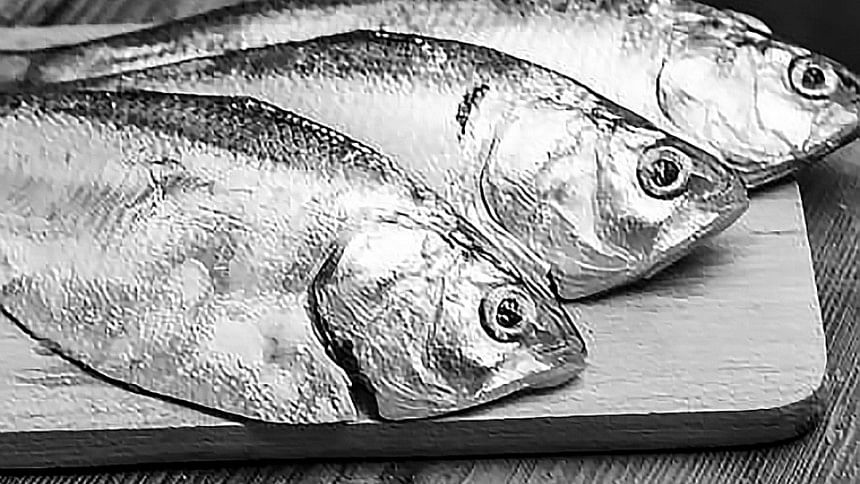
My mother told me to get a big Ilish maach for Pohela Baishakh. My face went pale. However much I claimed to love my mother, I had no wish to go to the maachher bazaar.
I whimpered, "I'm a girl, Amma. The few times I had been to fish-market, I ended in disaster. Remember, I even fell down and created a scene at the bazaar? And you want me to go to there for Ilish?" Mother was ill but her temper was as unpredictable as ever. She raised her head a little from her pillows and scowled at me like a cat. At that moment, she looked exactly like the feisty grey cat that many have seen frolicking about the Road 4 and 5 of Dhanmondi.
"When have I ever asked you to go to fish-market? What gibberish! Go straight to Agora and get the Ilish. And bring a big one." Then she started grumbling about the inefficiency of her two children (poor me and my poor brother), the two lazy buas who apparently gossiped through the day, and the two useless drivers that did nothing but smoke.
I looked around her room. It was clean and shining—obviously the buas kept it neat and clean. I had just been to the bathroom, and it was spotless too. I am at least five times pickier than my mom and I would be yelling at the maids if they left things in a sorry condition. They were actually more scared of me than my mother. I sighed and got up.
It was only April 3 and she wanted the fish right away. I did try to make my mother understand that hilsa would indeed be available a day or two before April 14. But as things were, it was easier to placate my entire extended family, but my mother would not be satisfied. I did ask Jamal bhai, my driver (he was not strictly speaking my driver, but a friend's), to get a hilsa. Unfortunately, the fish-market men had secreted the hilsa or frozen them at the prospect of Pohela Baishakh. All there was to be had were what they call Jatka (young hilsa).
As I was going out of her room, my mother barked, "A big Ilish, you understand? I don't want to eat Ilish all the year round, do I? Just on Pohela Baishakh. Why have you pulled a long face?" I turned around to give her the flash of a dazzling smile and then hurried out of her room. The two buas were grinning at me at the prospect of hilsa. I remembered that only a few months earlier, Mom had thrown out two whole hilsas my uncle had brought for my dad. She was adamant that she could not possibly inhale the aroma of cooked Ilish. She had been ill for quite some time and had dietary restrictions. Somehow our healthy food habit also irked her. Only the other day she was shouting at me for having kochu shak bharta. "How did that thing get on the dining table? Don't you know that I hate kochu?"
Sometimes I couldn't help wondering what had gone wrong. She was always so caring and had our favourite dishes on the table. At our home, the staple these days were soft rice, green papaya, gourd, bitter-gourd, plantain, potato and two or three types of fish that were cooked alternately. Oh, and chicken and eggs, of course. But nothing else could enter the kitchen. She would sniff the air and if scented anything else, there would be havoc. My father had a voracious appetite but whenever he wanted beef or some other kind of meat, mom would whisper hoarsely, "How can you think of eating when I'm so ill?"
Anyway, I should have been happy that she had finally agreed to have hilsa at home. But if I didn't get it within a day or two, she would surely start screaming and exhaust herself in the process. I heaved a sigh again and asked Jamal bhai to drive me to Agora which was just a few blocks away. Yes, there were fish, alright. There were huge sized ruis, katlas, boal and what not, and different kinds of sea-fish. There were pomfreys, shrimps and lobsters. Tunas, crabs and squids even. But no sign of my mom's precious Ilish. I asked the vendors and learnt that they would surely come before the Pohela Baishakh. They showed me the jatkas, as usual. Those were barely a foot long and staring at me from the ice. One of the men grinned, "Don't you worry, Madam. The Ilish are being prepared for the Pohela Baishakh." I was exasperated and bit out, "Yes, of course. You are raising them from the eggs to sell at an exorbitant price." The man who knew me as a regular customer, touched his earlobes with both hands and said, "What are you saying, Madam? Would we do that?"
I instructed both Mamun and Jamal Bhai to be on the lookout for a big hilsa. There were none at the regular fish market. The only problem was that my mother would not believe us. She said she knew that there were Ilish hidden somewhere in those super shops, but we, her two good-for-nothing children were unable to fulfill the wishes of a dying mother. As I was heading to the university, I suddenly saw one of the trucks that sold fish. These were run by the government I had heard and they usually carry fresh fish.
"Jamal Bhai, stop," I screeched. Jamal Bhai, thankfully, was an expert driver and hence managed not to collide with the road divider. He asked politely, "What's it, Apu? Have you forgotten something? Should I go back home?"
"No, no, stop by the fish truck. Maybe, they'll have Ilish."
Jamal bhai parked the car behind the fish truck. As I got down, I could see two men sitting under the truck and working away on large fishes—scaling, chopping and slicing for waiting customers.
Jamal Bhai also got down with me. "Hey, do you have Ilish?" he hollered.
One of the fellows looked at us and laughed. "It's not Pohela Baishakh yet. You look for Ilish a day or two before the Pohela Baishakh. Have other kinds now. We've Rui and Pangash—fresh from the pond. Would you like some?"
I shook my head and said, "They're good fish but mother wants Ilish. And she wants it NOW."
I wondered frantically where else we could get hilsa. We had been to Meena Bazar, to Shopno. Hilsa was nowhere to be found. Mamun, my brother's driver, is a young fellow and full of ideas. He scratched his head and asked if catching an Ilsha would not be easier.
On the morning of Apil 8, I woke up with an aching neck and sore body. I had been dreaming of at least ten hilsas smirking at me. I was sure if it went like this a few more days, I would wake up as an Ilish Maach myself. Someone rang the bell and I looked at the wall-clock. It was 7:10. Who could it be? I could faintly hear voices since my room was right beside the main entrance. I thought I heard "Ilish maach!" I bolted and rushed out of the bedroom. Oh, our full-time bua was standing with a wide smile at the door, chatting away amiably while Jamal Bhai and Mamun stood holding out not one but two beautiful silver hilsas. Both were quite big. I could not fathom how the two of them got together so early in the morning since they work on different schedules. I heard them saying that they had gone to Narayanganj to get the hilsas directly from the fishermen.
***
She sat at the lunch table. Her eyes were closed and she seemed to be savouring the aroma of the cooked mustard hilsa with a beatific expression on her face. My brother looked on bemused. Things that parents do for their children! At that moment, I keenly felt our reversed roles. All the hassle we had been going through for the past five days seemed worth that one smile on her face. Finally, Amma was finally having her Ilish.
It has been ten months since my mother left us. It is not that I have not had hilsa since then. But I cannot help wondering how in the world am I going to eat Ilish this coming Pohela Boishakh!
Sohana Manzoor is Associate Professor, Department of English & Humanities, ULAB. Currently, she is also the Literary Editor of The Daily Star.

 For all latest news, follow The Daily Star's Google News channel.
For all latest news, follow The Daily Star's Google News channel. 

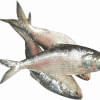
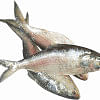
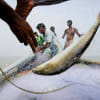
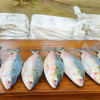


Comments